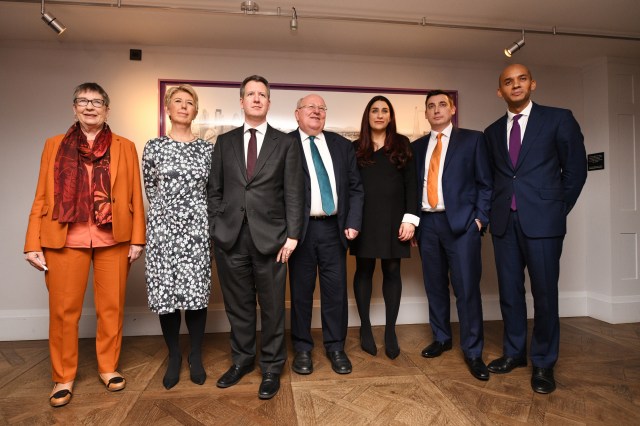Credit: Leon Neal/Getty Images

Where are the most sensible people in politics? Well, in the centre, of course – rationally weighing up the arguments and generally holding things together. I’m sure that Chuka Umunna and his centrist groupuscule of ex-Labourites would agree.
But, actually, that’s just a little too simplistic for the more sophisticated centrist. You see, one must allow for the fact that ‘to govern is to decide’ – and therefore that one must have options to decide between. In a democracy, that means giving voters a choice between two main parties or blocks – usually one of the centre-Left and one of the centre-Right.
Obviously, the after-the-hyphen tendencies of each block need to be kept in check; and unless some kind of national course correction is required, the centrist politicians of each party should be the ones in the driving seat.
Absolute centrists who’d rather not dirty their hands with direct participation in party politics can hold themselves above the fray – commenting on events from their perches in the ‘quality’ media.
These are the ultimate rationalists, taking a pragmatic view of the expediencies of democracy in action, but also conscious of what would ideally be done – if only everybody were as reasonable, knowledgeable and unprejudiced as themselves. Should they experience the occasional twinge of self-doubt, all they need do is behold the spectacle of life beyond the fringe of polite opinion. The absolute necessity of their continued moderating influence will be made abundantly clear.
And indeed, the most obvious weirdos tend to be out on a limb. Anyone who for any reason (or lack of reason) is fundamentally unhappy with the status quo is likely to find themselves off-centre in some fashion. After all, ‘eccentric’ literally means ‘out of centre’.
The favourite prey of the sophisticated centrist is the unsophisticated ideologue – preferably a politician or pundit who’s screwed-up a statistic or misinterpreted a bit of history. Setting their phasers to ‘patronise’, the sophisticates then charge in – mocking the minor error of inaccuracy to expose the major error of strongly-held belief.
But can they be so sure of their own inerrancy? They may regard themselves as unideological, but there is no such thing as a neutral worldview, no self-conception of rationality that doesn’t depend on irreducible assumptions. Just look at the ‘received wisdom’ of the past. Is there a single era of history in which the intellectual middle ground wasn’t convinced of things that we now see as nonsense?
This raises two further questions: How did these past establishments get away with it? And are we any different today? The answer to the first is that though the mainstream view may have been nonsense, it was at least high-functioning nonsense. Even when objectively wrong, it nevertheless served a practical end – such as not upsetting powerful people by disagreeing with them.
As to whether we’re any different today, in all likelihood we’re not. There are things that all the ‘right people’ say and think in the early 21st century that will seem utterly demented in fifty or a hundred years time.
All of which brings me, in a good way, to Margaret Sullivan in the Washington Post, who argues that the mainstream media is too mainstream. She attacks the “smarmy centrism that often benefits nobody, but promises that you won’t offend anyone”!
“Who is the media’s middle-lane approach actually good for?
“Not the public, certainly, since readers and viewers would benefit from strong viewpoints across the full spectrum of political thought, not just minor variations of the same old stuff.
“But it is great for politicians and pundits who bill themselves as centrists.”
She mentions the lavish publicity received by Starbucks founder Howard Schultz for his possible Presidential run – on a “fiscally conservative, socially liberal” platform. And also the moderate Republicans snapped up as commentators by the likes of CNN and CBS:
“You see it, too, in the supposedly daring, supposedly against-the-grain hires made by magazines and by newspaper op-ed pages. In their quest to run the full gamut from center-left to center-right, they are already well-equipped with anti-Trump conservatives.”
What’s the problem with this? It’s not the mere fact of being anti-Trump. Nor is there anything wrong with the journalistic ethics of fairness and rigour. As long as the mainstream media practises these virtues as well as preaching them, then that’s all to the good.
The problem though comes when balance becomes blinkered. As Sullivan puts it, “impartiality is a value worth defending in mainstream news coverage… but you don’t get there by walking down the centre line with a blindfold on.”
The great failure of the mainstream media is not its failure to give voice to Trumpism now, but its failure to see Trumpism coming. And how could it have, since it was staffed by people ill-equipped to have imagined such a thing, let alone understand it?
Ultimately, the fatal weakness of the centrist punditocracy is not its elitism, but that they’re just as human as anybody else – and, just as anybody else would, they’ve found it hard to internalise the extent to which their people screwed-up in power.
Populists succeed when establishments fail. That’s why it’s vital that the media draws upon a wide range of perspectives, not just those that take the establishment’s wisdom for granted.










Join the discussion
Join like minded readers that support our journalism by becoming a paid subscriber
To join the discussion in the comments, become a paid subscriber.
Join like minded readers that support our journalism, read unlimited articles and enjoy other subscriber-only benefits.
Subscribe